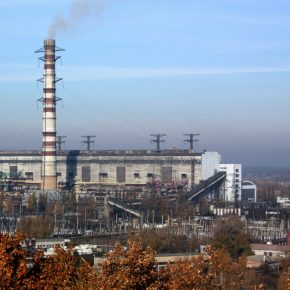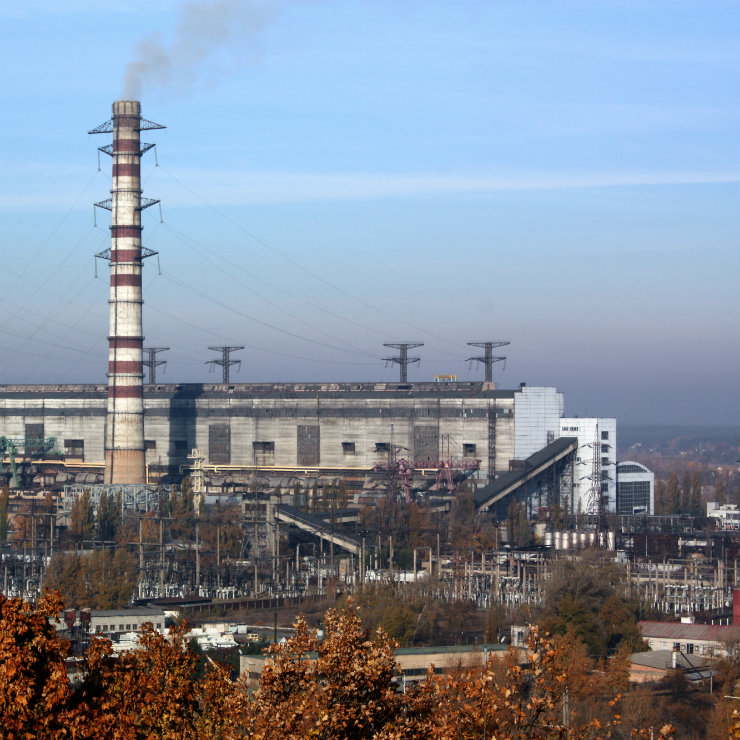Tydzień w gospodarce
Category: Trendy gospodarcze

Centrenergo, Trypilska Power Plant, Ukraine (Dmitri Tovstonog, CC BY-SA)
Bohdan Danylyshyn, the Head of the Council of the National Bank of Ukraine, believes that both the state authorities and the central bank should take account of the threats related to the introduction of martial law in their activities. In his opinion, the unfolding events may reduce the investment attractiveness of Ukraine, and therefore it is necessary to conduct consultations and to explain the situation to domestic and foreign investors to prevent possible adverse changes concerning their plans for investment in Ukraine.
Due to the current circumstances and the increase in risk, which nullifies the beneficial effects of the agreements concluded with the IMF and the European Union, the costs of foreign loans are likely to remain high. One can also expect a slowdown in the process of privatization of state-owned enterprises — on the one hand due to a decrease in demand for Ukrainian assets, and on the other, due to a decline in the prices that potential buyers would be willing to pay.
According to the Oleg Ustenko, economist from the Blazer Foundation, the key problem and a source of uncertainty is Ukraine’s ability to meet its debt obligations, as a significant portion of the resources are currently allocated for national defence-related purposes. In this situation the logical thing to do would be to amend the previously adopted budget for 2019. If external financing is not secured, the country’s financial stability may be compromised, and Ukraine could be forced to freeze wages. It is also likely that in 2019 the Ukrainian economy won’t receive the USD2bn that it was previously expecting from FDIs. The reason is the elevated level of political risk. Additionally, the already strong trend of workers migrating abroad is likely to further intensify. That, in turn, will affect the revenues of the National Pension Fund of Ukraine and the state budget, warns Mr. Ustenko. According to the economist, the country could experience an outflow of investment, a decrease in foreign exchange income, as well as significant increases in the prices of imported goods, and consequently also in inflation.
“Our oligarchs, who are responsible for the major share of the revenues, will try to keep them abroad and to siphon them off to tax havens, while the importers will set the prices of goods not on the basis of the current exchange rate of the USD, but on the basis of their expectations concerning future devaluation of the UAH. One quarter of our consumption depends on imports, so with a devaluation of 10 per cent gives an additional inflationary impulse of 2.5 per cent, which means that instead of an inflation rate of 7.5 per cent, as forecasted in the budget, we will have an inflation rate of 10 per cent. Foreign investors also will not be willing to invest their money in Ukraine’s economy. As a result, FDI inflows could decline by 10 to 20 per cent compared to the preliminary estimates, which indicated that the value of foreign investment in 2019 would amount to USD2bn,” predicts Mr. Ustenko.
“From a legal point of view, the introduction of martial law hasn’t affected the market yet. However, in terms of psychological impact, the very fact that it has been imposed influences the expectations and the sentiments of the consumers and the investors, which may lead to reduced demand and investment,” said analyst Natalia Kochergina.
Ukrainian business is worried about martial law’s long-term effects on the economy, argues the economist Alexey Kushch in an analysis published in the Kiev-based magazine “Focus”. Among the main concerns, he lists the increased influence of the law enforcement institutions, which could start seizing lucrative businesses from their owners. Mr. Kushch notes that in conditions of political instability, business limits its investment and withdraws capital, while consumers reduce their expenses to the basic needs and start saving money. According to his estimates, the total additional outflow of capital from Ukraine could reach a USD1bn in the next several months.
“The rate of development of the economy doesn’t always follow mathematical models of economic growth and the function of profit maximization. Medium-term development trends are determined with the use of models in which the decisions of participants in economic processes are influenced by social and psychological factors, as well as those related to the perception of the situation. The main limitation is the horizon of the rational expectations of participants, such as consumers or foreign investors,” assesses Mr. Kushch. In his opinion, the introduction of martial law could hurt macroeconomic stability, which private capital does not want to provide, and the state will not be able to provide.
This view is confirmed by the representatives of investment companies active in the Ukrainian IT sector, who were interviewed by the Liga.net news agency. In their opinion, the introduction of martial law will negatively affect the industry. The entrepreneurs believe that the increasing tensions will in the first place inhibit the inflow of new investors to Ukraine. Concerned for the feasibility of order fulfilment, foreign customers will submit their orders to the competitors, such as India, which is emerging as an IT powerhouse. It is also possible that entire work teams could be moved abroad.
According to Yuri Romanenko from the think-tank Ukrainian Institute for the Future, at the local level martial law could be used as a tool for hostile takeovers of enterprises. “I think that it is already obvious to everyone that martial law has turned out to be yet another charade which is to be exploited by some people for the pursuit of their business interests. First and foremost, this involves the forced takeover of enterprises,” he commented.
Meanwhile, fears that Ukraine’s cooperation with the International Monetary Fund could be suspended have proved to be premature. “The IMF doesn’t give money to countries that are at war. No one seems to take this into consideration when raising the issue of martial law,” argued the President of Ukraine Petro Poroshenko in the summer of 2014. However, the IMF has already assured that the implementation of the Stand-By Arrangement would be continued, regardless of the imposition of martial law. “There are no formal legal prohibitions preventing the continuation of cooperation under the conditions of martial law. We have cooperated with a number of countries in which armed conflicts of varying intensity were taking place,” informed the IMF’s office in Kiev.
So far, the current circumstances have affected the privatization process in Ukraine the most. In December 2018, two days before the scheduled date, the government cancelled the auction for the sale of the Centrenergo energy company. The terms and conditions of the privatization contained a provision stating that at least two bidders must participate in the tender, including at least one entity from abroad. The 78.3 per cent stake in the company was submitted for sale with a starting price of UAH5.98bn. The tender announcement was published on October 2018, and the contest was scheduled for December 13th. The government hoped that the introduction of martial law would not interfere with the company’s privatization. Six investors initially expressed their intention to participate in this privatization procedure.
The Ukrainian government had been contacted by the representatives of Western energy companies, including the French multinational Engie, who were interested in participating in Centernergo’s privatization. However, they all eventually withdrew. “To publish the terms of the tender a month in advance and to provide one month for investors to gather more than USD200m in Ukraine, right before the elections and with martial law in place. That’s unrealistic,” stated Andrey Favorov, the head of the company Energy Resources of Ukraine, in an interview with Economichna Pravda.
His statement was confirmed by Serhiy Leshchenko, a member of the Ukrainian Parliament, who announced one day before the scheduled date of the auction that the Western investors had withdrawn from the procedure due to martial law. Although one company from Belarus applied to participate in the tender, it turned out that it was backed by Russian capital, so it was excluded. As a result the tender and privatization process was cancelled.


